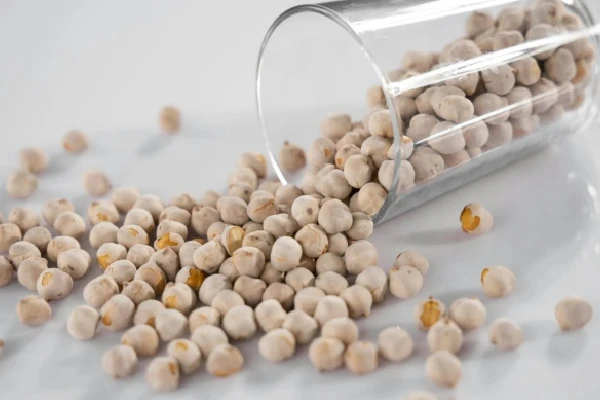Gut Health & Hormones: What’s the Link?
Wednesday Jun 22, 2022

An unhealthy gut can lead to a variety of health consequences that stretch far beyond your stomach. For example, your gut produces roughly 95% of your body's serotonin, and research shows that an unhealthy gut contributes to mental health issues like depression and anxiety.
Or, here's another example: Did you know that an unhealthy gut could be the root cause of your acne?
Your gut health can impact weight loss too (as if losing weight isn't already hard enough). And that doesn't even get into food sensitivities or the increased risk of disease you set yourself up for by not taking care of your gut.
There's even a link between gut health and hormones, which is what this post is all about.
How Gut Health Impacts Your Hormones
Gut health and hormone health are very closely related. In fact, they're so close you should ask yourself: What's the impact of gut health for my hormones?
Here's a quick rundown on the relationship between gut health and hormones :
- Did you know that roughly 70% of your immune system can be found in your gut? So if your gut becomes compromised, it can result in various conditions or disorders (think leaky gut, digestive issues like constipation or bloating, and autoimmune disorders like celiac disease). This can also cause hormone imbalances.
- Your gut absorbs nutrients that are used to produce hormones from the food you consume.
- Thyroid conversion (which impacts your metabolism and digestive health, among other things) gets impacted by what's going on in your gut.
- Your gut helps regulate blood sugar, which is key to hormone balance.
- A collection of bacteria, known as your estrobolome, live in your gut. Your estrobolome is responsible for metabolizing and regulating your body's estrogen.
Now, let's peel back the layers and dive into each point in a little more detail.
Leaky Gut and Other Disorders
When bad microbes overtake the good, your gut becomes imbalanced, which can lead to increased inflammation and give way to conditions like leaky gut (when damage to your gut lining allows the contents of your gut to leak out into the bloodstream).
Your hormones don't escape a hostile takeover by bad bacteria unscathed. For women, this can affect the menstrual cycle. Specifically, this impacts ovulation and progesterone creation (which is a precursor for infertility).
Impaired Nutrient Absorption
An imbalanced gut makes it hard for the body to absorb nutrients from the foods we eat, which is key to producing hormones. After a while, it can cause nutrient deficiencies, which is the main cause of a lot of hormone imbalances.
Compromised Thyroid Function
Roughly 20% of thyroid hormone conversion occurs in your gut. Thyroid hormone conversion is the process where your body makes sure you get enough T3 (a thyroid hormone key to metabolism, digestion, and heart, bone, and brain health).
Hypothyroidism, a condition when your thyroid isn't functioning properly, can also result from a gut imbalance. Symptoms include fatigue, constipation, weight gain, and muscle weakness.
Hormone Imbalances From Blood Sugar
When you struggle to maintain healthy blood sugar levels, you may become insulin resistant, which is when your pancreas keeps pumping out more and more insulin to get your blood sugar levels back under control.
Over time though, your body becomes desensitized to the high levels of insulin, which results in elevated blood sugar levels, hormone imbalances, and potentially diabetes. For your hormones, elevated insulin levels can cause a woman's ovaries to produce more testosterone, with the end result being facial hair or acne.
Impact to Your Estrobolome
Your estrobolome is a group of microbes in your gut that are responsible for keeping your estrogen at healthy levels. But when your gut becomes imbalanced, so does your estrobolome.
That can lead to estrogen dominance, a hormone imbalance with symptoms like heavy and painful periods, PMS, bloating, fatigue, mood swings, and weight gain. Your gut health can also play a part in menopause. When it's balanced and healthy, it may help reduce symptoms.
Tips for a Healthy Gut and Hormones
Use these tips on how to improve gut health naturally and achieve optimal hormone balance:
- The first step to finding out what's going on in your gut is to get your gut tested. If you can narrow things down, it'll help you form a more customized approach to improving your gut health, and ultimately, your hormones.
- Cut back on processed foods and center your diet on nutrient-dense whole foods. We recommend incorporating more plant-based foods into your diet, like beans, lentils, and cruciferous vegetables (broccoli, cauliflower, cabbage, etc). Unsaturated fats like walnuts and olive oil are also beneficial to your gut health and hormones. And then for some omega-3 fatty acids, throw in some fatty fish like salmon, mackerel, and herring.
- Eat enough probiotics, which can help balance out your gut and improve the number of healthy bacteria. Foods high in probiotics include yogurt, sauerkraut, tempeh, kimchi, and kombucha. Probiotic supplements are another convenient option for improving gut health. Everyone's gut is different, so customized probiotic supplements that fit your individual gut profile work best.
- Getting enough sleep has been linked to a healthy gut, which if we're being honest with ourselves, can be easier said than done. Good sleep hygiene starts 1-2 hours before hitting the hay, so start the process for bedtime then. A nighttime routine—like a relaxing salt bath, reading a good book, or guided meditation—signals to your body that it's time to wind down and can make falling asleep a lot easier. Also, be sure to limit screen time before bed. The blue light emitted from cell phones and electronic devices can disturb your circadian rhythm and keep you up.
- Stress not only impacts your general health (Did you know stress can lead to weight gain?) but it has an impact on your gut health too. To relieve stress, try going on a walk, taking up yoga, or find a creative hobby you can enjoy that takes the edge off and gets your mind focused on something productive.
About the Author
Chad Richardson is a freelance writer from Cincinnati, OH who also enjoys going to the gym and doing his best Arnold Schwarzenegger impersonation, scrolling through Netflix trying to find a new binge-worthy show, and catching a game to root on his hometown sports teams.


